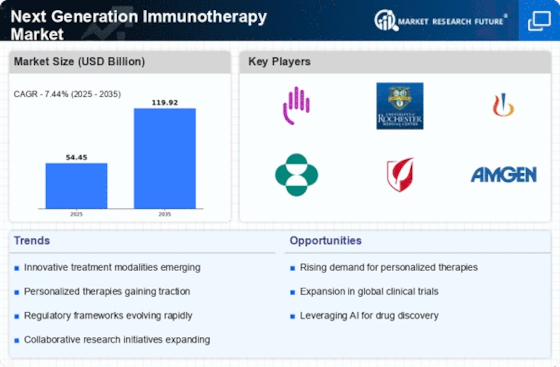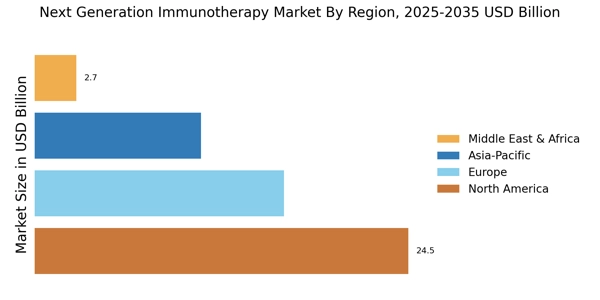Rising Incidence of Cancer
The increasing prevalence of cancer worldwide is a primary driver for the Next Generation Immunotherapy Market. According to recent statistics, cancer cases are projected to rise significantly, with estimates suggesting that by 2040, there could be over 27 million new cancer cases annually. This alarming trend necessitates innovative treatment options, propelling the demand for advanced immunotherapies. As traditional therapies often fall short, the Next Generation Immunotherapy Market is positioned to address this urgent need, offering targeted and personalized treatment modalities that enhance patient outcomes. The shift towards immunotherapy is further supported by the growing body of clinical evidence demonstrating its efficacy in various cancer types, thereby attracting investment and research into novel immunotherapeutic agents.
Regulatory Support for Innovative Therapies
Regulatory bodies are increasingly supportive of innovative therapies, which serves as a significant driver for the Next Generation Immunotherapy Market. Streamlined approval processes and adaptive trial designs are being implemented to expedite the development of promising immunotherapeutic agents. For instance, the FDA has introduced initiatives such as the Breakthrough Therapy Designation, which facilitates faster access to therapies that demonstrate substantial improvement over existing treatments. This regulatory environment encourages pharmaceutical companies to invest in the development of next-generation immunotherapies. As a result, the market is witnessing a surge in the number of approved immunotherapeutic products, which is likely to enhance competition and drive further innovation within the Next Generation Immunotherapy Market.
Technological Advancements in Immunotherapy
Technological innovations are transforming the landscape of the Next Generation Immunotherapy Market. Advances in genetic engineering, such as CRISPR and CAR-T cell therapy, are enabling the development of more effective and personalized immunotherapies. These technologies allow for precise targeting of cancer cells while sparing healthy tissues, which is a significant improvement over conventional treatments. The market is witnessing a surge in research and development activities, with funding for immunotherapy projects reaching unprecedented levels. For instance, The Next Generation Immunotherapy Market was valued at approximately 100 billion USD in 2023, with projections indicating a compound annual growth rate of over 15% through the next decade. This growth is indicative of the potential that technological advancements hold for revolutionizing cancer treatment.
Increased Investment in Research and Development
Investment in research and development is a crucial driver for the Next Generation Immunotherapy Market. Pharmaceutical companies and biotech firms are increasingly allocating resources to explore novel immunotherapeutic approaches. In 2023, it was reported that global spending on cancer research exceeded 50 billion USD, with a significant portion directed towards immunotherapy. This influx of capital is fostering innovation, leading to the discovery of new therapeutic targets and the development of combination therapies that enhance treatment efficacy. Furthermore, collaborations between academic institutions and industry players are becoming more prevalent, facilitating the translation of research findings into clinical applications. As a result, the Next Generation Immunotherapy Market is likely to experience accelerated growth, driven by a robust pipeline of new therapies.
Growing Awareness and Acceptance of Immunotherapy
The growing awareness and acceptance of immunotherapy among healthcare professionals and patients are pivotal for the Next Generation Immunotherapy Market. As more clinical data emerges showcasing the benefits of immunotherapy, including improved survival rates and quality of life for patients, the medical community is increasingly adopting these treatments. Educational initiatives and patient advocacy groups are playing a vital role in disseminating information about the advantages of immunotherapy over traditional therapies. This shift in perception is reflected in the rising number of clinical trials and the expanding approval of immunotherapeutic agents by regulatory bodies. Consequently, the Next Generation Immunotherapy Market is poised for growth as more patients seek these innovative treatment options.

















